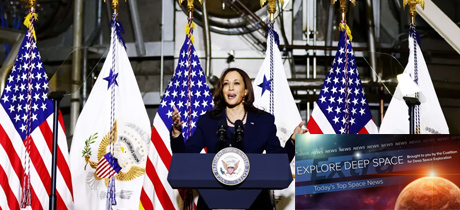In Today’s Deep Space Extra… NASA astronauts embark on spacewalk to replace faulty antenna after delays due to debris concerns. National Space Council focusing priorities on building a U.S. STEM workforce; addressing climate change; and promoting rules and norms for space.
Human Space Exploration
Astronauts cleared for spacewalk two days after debris concerns
CBSnews.com (12/2): NASA astronauts Tom Marshburn and Kayla Barron donned their space suits early Thursday for a spacewalk outside the International Space Station (ISS). Initially planned for early Tuesday, the excursion was rescheduled so the agency could assess an orbital debris concern that arose hours before the initial planned start. During the six-to-seven-hour excursion, Marshburn and Barron are to replace a failing S-band communications on the ISS’s exterior. The orbital debris concern was a topic of discussion during Wednesday’s first meeting of the National Space Council under the Biden administration and triggered by a mid-November Russian anti-satellite test. Vice President Kamala Harris, who chairs the council, condemned the Russian test and said the U.S. will strive to establish low Earth orbit rules and norms to enhance the safety of astronauts and satellite operations. NASA is broadcasting Thursday’s spacewalk activities, which started at 6:15 a.m. EST, about an hour early, on NASA TV and www.nasa.gov/nasalive.
Space Science
Comet Leonard will light up the sky this month – here’s how to see it
Space.com (12/1): Recently discovered, Comet C/2021, also known as Comet Leonard, should be visible to telescopes and perhaps the unaided eye in the pre-dawn skies of the Northern Hemisphere initially in December and perhaps just after sunset later in the month.
Arecibo Observatory: A year after telescope’s collapse, an icon gets continuing cleanup and a new documentary
Space.com (12/1): The collapse left Arecibo’s dedicated science community reeling and wondering what would come next for the site. A year later, that’s still unknown. The NSF has prioritized cleaning up the site over making any decisions about the facility’s future, even as scientists begin dreaming up ambitious ideas to carry on the telescope’s legacy. The radio telescope began observations in 1963 and was unique in that it was a valuable tool for three different scientific fields: studying Earth’s atmosphere, detecting radio light from the universe around us, and using an active radar system to study the solar system, particularly near-Earth asteroids. The telescope will star in the film “The Biggest Dream,” a documentary about Arecibo’s origins, legacy and loss.
Other News
Biden-Harris space priorities framework calls for robust space enterprise, space sustainability
Spacepolicyonline.com (12/1): Before the National Space Council convened for the first time on Wednesday under the Biden Administration, the White House released a Space Priorities Framework. The seven-page document identifies two priorities and a series of actions to address them. One priority is maintaining a robust and responsible U.S. space enterprise by maintaining leadership in space exploration and space science, advancing the development and use of space-based Earth observation capabilities, fostering a favorable policy and regulatory environment for commercial space, protecting space-related critical infrastructure, defending U.S. national security interests, and investing in the next generation. The other one is preserving space for current and future generations by strengthening global governance of space activities, bolstering space situational awareness sharing and space traffic coordination, and prioritizing space sustainability and planetary protection. The White House enlarged the number of council members from 15 to 20, adding the secretaries of Education, Agriculture, Labor and Interior as well as the National Climate Advisor.
Biden administration turns focus to space security
SpaceNews.com (12/1): The National Space Council met for the first time Wednesday under the jurisdiction of the Biden Administration. Serving as the new chair, Vice President Kamala Harris emphasized three priorities, keeping the space domain secure; addressing climate change; and supporting STEM education. The Pentagon will have a strong voice in addressing space norms, a topic that has gained significant attention following Russia’s November 15 missile strike that blew up a satellite in orbit.

